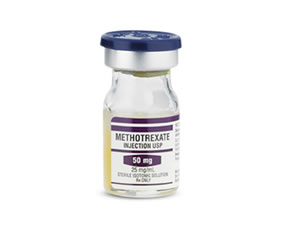
Measuring the amount of polyglutamated methotrexate within red blood cells has been proposed as an objective method of tracking medication response and predicting drug toxicity. However, there are only limited data evaluating this method. Here, Stamp et al (Arthritis Rheum 2010; 62(2)): 359) cross-sectionally explore the associations of RBC polyglutamated methotrexate levels with disease activity and adverse events.
Methods
Patients with rheumatoid arthritis receiving treatment with methotrexate for at least 3 months and followed in Christchurch, New Zealand had trough concentrations of the number of glutamate moieties associated with RBC methotrexate (1 to 5 glutamates) measured. The association of the extent of RBC polyglutamated methotrexate with disease activity and safety measures were explored.
Results
A total of 192 patients were studied. The average age of enrolled patients was 60 years with average disease duration of approximately a decade. About 90% of the patients were on methotrexate monotherapy for a median of three years prior to enrollment at a current median dose of 15 mg/week.
Methotrexate dosage was associated with higher polyglutamate concentrations and was also correlated with several indicators of disease activity. Polyglutamated RBC methotrexate was correlated with disease activity measures (swollen and tender joint counts and the DAS28 score) and other disease status measures (fatigue and HAQ score), even after adjusting for demographic and lifestyle factors, concomitant treatments, and autoantibodies. However, there was no association with disease activity after adjusting for estimated glomerular filtration rate and methotrexate dosage, except to pentaglutamated RBC methotrexate, which was significantly higher in patients categorized as high disease activity (DAS28>3.2) compared to those with lower disease activity. These results were not substantially altered after accounting for RBC folate concentration. There were no associations between polyglutamated RBC methotrexate concentrations and adverse events.
Conclusions
Higher polyglutamated RBC methotrexate concentration was not an indicator of disease control or of adverse events in this cross-sectional analysis.
Editorial Comment
Methotrexate is a slow acting medication that may not lead to an acceptable clinical response in all patients. Thus, there is some value in having an objective advanced predictor of response, so that valuable time is not wasted titrating an ultimately ineffective medication. While this study is compelling, larger than other prior studies, and considers additional confounding factors that were neglected in the other studies, it is still unclear for the findings presented here whether there is a clinical role for measuring polyglutamated RBC methotrexate. The major liability to the study presented here is the cross-sectional nature of the analysis, which limits any ability to assess temporality. In particular, using these cross-sectional data to make conclusions about the ability of polyglutamated RBC methotrexate to predict adverse events is prone to misinterpretation. Further work will require longitudinal studies in methotrexate naïve patients in order to be interpretable.

